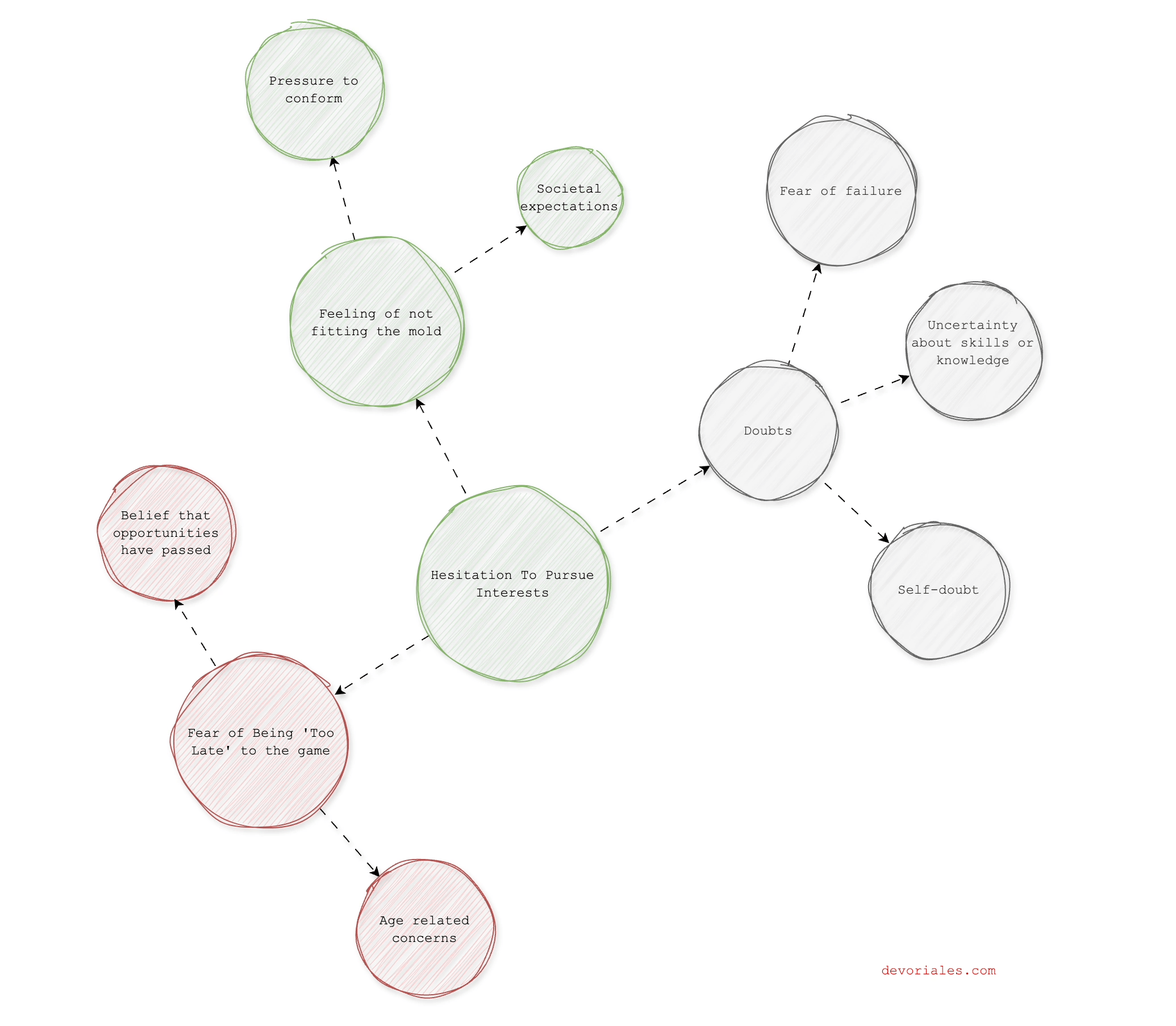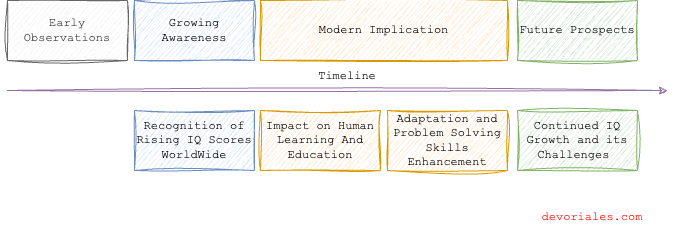
Diverse Paths to Success
👋 Hi, Aleks here. Welcome to the Devoriales Newsletter 🗞. We cover technology, startups, and life's big questions, sharing stories about the challenges we face. In this issue, we reflect on the book "Range" by David Epstein, exploring the benefits of having a broad skill set.
Got this forwarded? Subscribe here and stay updated.
I recently read "Range: Why Generalists Triumph in a Specialized World" by David Epstein. Some books even, decent ones, tends to fade over time, but this one truly resonated with me, leaving a lasting impact. It speaks a lot to both my personal experiences and observations in many aspects in life.
Often, we hesitate to pursue our interests, plagued by doubts and the fear of being 'too late to the game' or as a saying tells 'not fitting the mold'
When reflecting over tech industry, there's a myth that success in tech is reserved for those who started coding in childhood or those with a highly specialized focus. However, I'm here to bust that myth and share a fact: that's simply not true.
Jack Ma, the founder of Alibaba, started his career as an English teacher. Despite lacking a technical background, his broad understanding of education, business, and international markets allowed him to build one of the world's largest e-commerce platforms. An anecdote about his early struggles and eventual success can illustrate the value of diverse experiences and adaptability.
Quote: "I'm not a tech guy. I'm looking at the technology with the eyes of my customers, normal people's eyes."
In this newsletter issue, we'll explore why entering a field with a diverse background can be a superpower. Inspired by the ideas in the book, we'll uncover how gaining experience in different fields, trying various roles, and even starting later in life can give you an edge in the tech industry.
Why? Because tech isn't just about coding or knowing the latest programming language. It's about solving problems, communicating, thinking creatively, and looking at challenges from different angles. Many of these skills can be mastered in various fields and are universal, applicable to any part of our lives.
Steve Jobs famously attributed much of Apple's success to a philosophy that emphasized the importance of a broad set of experiences. He believed that a diverse knowledge base could spark creativity and innovation. Highlighting his calligraphy class as an influence on Apple's focus on typography and design could serve as a powerful example.
Quote: "It was beautiful, historical, artistically subtle in a way that science can't capture, and I found it fascinating. None of this had even a hope of any practical application in my life. But ten years later, when we were designing the first Macintosh computer, it all came back to me."
Having a range of experiences means you've seen more, tried more, and experienced both failure and success in various ways. This doesn't just make you interesting at parties; it makes you incredibly valuable in a field that thrives on innovation and adaptability.
The Myth of Early Specialization
Many people think that to succeed in tech, you need to have been coding since you were in diapers, immersing yourself in codes and algorithms from the get-go. That's a misconception. This myth perpetuates the idea that only those who start young and hyper-specialize can achieve success in the tech industry—a narrative as outdated as believing only those who began cooking before they could walk can become great chefs. While an early start can be beneficial, it's not the sole path to a fulfilling career in tech. In fact, too narrow a focus early on could restrict progress in areas beyond mere coding, overlooking the broader spectrum of skills the tech industry demands.

Chasing our interests and passions is often seen as the secret to a fulfilling life. But many of us hesitate, held back by doubts and fears that can be paralyzing. Understanding these doubts is the first step to overcoming them. That's what I'm showing in the diagram above, though there are many other things that hold us back too.
One interesting story in the book is about the "Flynn Effect," named after researcher James R. Flynn. This phenomenon shows a consistent and significant increase in IQ scores worldwide over the past century. It suggests a profound shift in our collective intellectual capabilities over generations. The implications of the Flynn Effect are far-reaching, especially for human learning, adaptation, and problem-solving.

At its core, the Flynn Effect challenges the idea that intellectual capabilities are static or solely determined by early life experiences. Instead, it highlights the plasticity of the human brain and our capacity for cognitive growth. This advancement has been attributed to factors such as improved nutrition, wider access to education, and the increasing complexity of our environments and technologies, which require more sophisticated cognitive processing.
Let's turn this into the tech. How is this relevant to aspiring tech professionals? It emphasizes the importance of critical thinking, problem-solving, and continuous learning in a rapidly evolving industry. The tech sector values individuals who can navigate and thrive amidst constant change, not just those who started coding early. Embracing change can lead to enjoyment and success in this dynamic field.
The illiterate of the 21st century will not be those who cannot read and write, but those who cannot learn, unlearn, and relearn.” — Alvin Toffler
Thinking that only early starters can succeed blinds us to the potential of those who bring diverse perspectives, skills, and experiences. These individuals often ask questions, challenge the norm, and drive innovation. I've learned to stay curious, explore new things, and question the options presented.
In my long career, I've noticed that many people don't ask questions when they don't understand, which can make it seem like everyone but you fully grasps the proposals and decisions. You usually notice this during small chats with individuals in coffee breaks after the meeting has taken place.
Consider Roger Federer's journey in tennis, as discussed in the book. Federer, unlike the prototypical early specialization narrative, sampled a wide range of sports before focusing on tennis. His diverse athletic background contributed to his exceptional adaptability and success on the tennis court. This example from the world of sports mirrors the tech industry's value in a broad skill set and the ability to learn and adapt over merely starting early.
In summary, the world is more inclusive and open than many believe. Success hinges on passion, curiosity, and a willingness to learn and adapt, not the timing of your entry into the field. The constantly evolving nature means there's always room for newcomers ready to embrace change and bring fresh perspectives to the table.
Here are some two true stories from the book that had I find interesting.
The Challenger space shuttle disaster in 1986 shows the critical need for incorporating diverse perspectives and qualitative judgment into decision-making processes, especially in high-stakes environments. Engineers at Morton Thiokol company, including Roger Boisjoly, had expressed grave concerns about the integrity of the shuttle's O-rings in the unusually cold weather forecasted for the launch day. Their worries were rooted in qualitative observations and experiential knowledge, rather than the quantitative data that NASA's decision-making culture traditionally demanded.
Boisjoly and his colleagues faced the daunting challenge of convincing NASA managers without the hard data typically required to stop a shuttle launch. Despite their persistent efforts and the presentation of compelling engineering judgment, their concerns were ultimately overridden. The tragic outcome of the Challenger mission, resulting from the O-ring failure, highlighted the limitations of relying solely on quantitative analysis and underscored the importance of heeding qualitative, experiential insights in complex situations.
This disaster prompted NASA to reevaluate its decision-making processes, emphasizing the need to balance hard data with the invaluable insights that come from broad, interdisciplinary perspectives. It serves as a poignant reminder of the indispensable value of integrating diverse forms of knowledge, especially when navigating the unpredictable and often perilous frontiers of space exploration. Roger Boisjoly's role and his ethical stance against the launch have become a focal point in discussions on engineering ethics, demonstrating the vital importance of voicing concerns and advocating for safety in the face of immense pressure.
The Yale School of Management is discussed in the context of understanding the difference between "kind" and "wicked" learning environments. Chris Argyris, a scholar, observed high-powered consultants from top business schools over fifteen years, noting their proficiency in well-defined, quickly assessed business school problems. These consultants relied heavily on "single-loop learning," favoring the first familiar solution that comes to mind, and often becoming defensive when their solutions failed. This approach was contrasted with the broader, more flexible learning strategies that are necessary in complex, real-world situations—a concept that mirrors the broader thesis of the book.
Chris Argyris found the consultants' inability to adapt or learn from mistakes surprising, given their role in teaching others to think differently. This is illustrated further by psychologist Barry Schwartz, who demonstrated how rewarding repetitive success in a logic puzzle hindered new students' ability to discover the general rule behind all solutions, highlighting the drawbacks of overly narrow learning and the importance of broader, more exploratory learning approaches. This analysis suggests that being effective in a complex, changing world requires more than deep specialization; it necessitates the ability to learn from a range of experiences and adapt to new challenges—key attributes of generalists
The U.S. Army struggled with high turnover rates among officers due to its model of early specialization. Talented officers, especially West Point graduates, often left the military after a few years for careers that better matched their evolving skills and interests.
The book explores this issue, showing that early career specialization led to dissatisfaction as officers' interests and values changed over time. In response, the Army introduced the Officer Career Satisfaction Program, giving officers more choice in their assignments in exchange for longer service. This improved retention and highlighted the benefits of flexibility and diverse experiences in career development.
The book's discussion underscores a broader trend: in a complex world, a generalist approach that values diverse experiences and adaptability is often more effective than narrow specialization. This case supports the book's central idea that a broad skill set and openness to new challenges can lead to greater success and satisfaction.
The Value of a Sampling Period
Imagine you're at a library filled with books on every subject imaginable. Would you check out the first book you come across? Probably not. You’d likely browse through a variety of topics before choosing the ones that truly interest you. This, in a nutshell, is the concept of a "sampling period."
Kind learning environments are predictable and rule-based, offering clear feedback, whereas wicked learning environments are characterized by uncertainty and complexity, requiring adaptability and broad experiences to navigate.
The book discusses about the power of trying out a range of experiences to discover where our true interests and strengths lie. It turns out that dabbling in different areas, roles, and even industries isn't just for the indecisive—it's a strategic approach to finding your niche.
The book encourages us to rethink our career paths. The idea that one must start with a singular focus from a young age is not only misleading but also limiting. This myth ignores the diverse skills needed to excel in various fields.
Generalists excel in environments that value problem-solving, adaptability, and continuous learning. They tackle challenges from multiple angles, integrating diverse experiences and knowledge to create innovative solutions. Stories from various fields, such as the Challenger disaster's lessons or the success of students from integrated science programs, highlight the importance of diverse experiences. Just as Roger Federer became a tennis legend because of his varied sports background, individuals who bring a range of skills and perspectives often push boundaries and drive progress.
Embracing the generalist path unlocks innovation and personal fulfillment. It allows us to explore, fail, learn, and ultimately discover where we can make the most significant impact.
So, how does this connect to the tech industry? The <tech> world is full of opportunities for those ready to embrace its challenges, regardless of when they start or how varied their backgrounds are. Success in tech hinges on passion, curiosity, and the relentless pursuit of knowledge—qualities not confined to early specialists.
If you're considering a leap into something but are held back by doubts about being "too late" or "not fitting in," remember that your diverse experiences are not just valuable—they are your superpower. The future belongs to those ready to blend their unique mix of skills and perspectives into creating something new and revolutionary. The game is always changing, and there's always room for another innovator at the table.
Why is this valuable in tech? Because the tech industry, with its rapid pace and constant innovation, isn't just about knowing how to do one thing really well. It's about understanding complex systems, adapting to new tools, and thinking creatively about problem-solving. Sampling different roles—be it in coding, design, project management, or sales—builds a toolkit of skills and perspectives that help you see the bigger picture and tackle challenges in innovative ways.
Trying different paths helps us understand our true passions. It's one thing to think you want to be an engineer, but it's another to try it and realize you're more excited about data analysis, UX design, or even sales. Sampling lets you pivot with purpose, not because you failed at one thing, but because you discovered a better fit elsewhere.
Bringing experiences from outside tech into the tech industry also leads to groundbreaking innovations. For instance, understanding customer service from a hospitality perspective can revolutionize user experience in tech products, or applying principles from architecture can inspire more structured and user-friendly software design.
